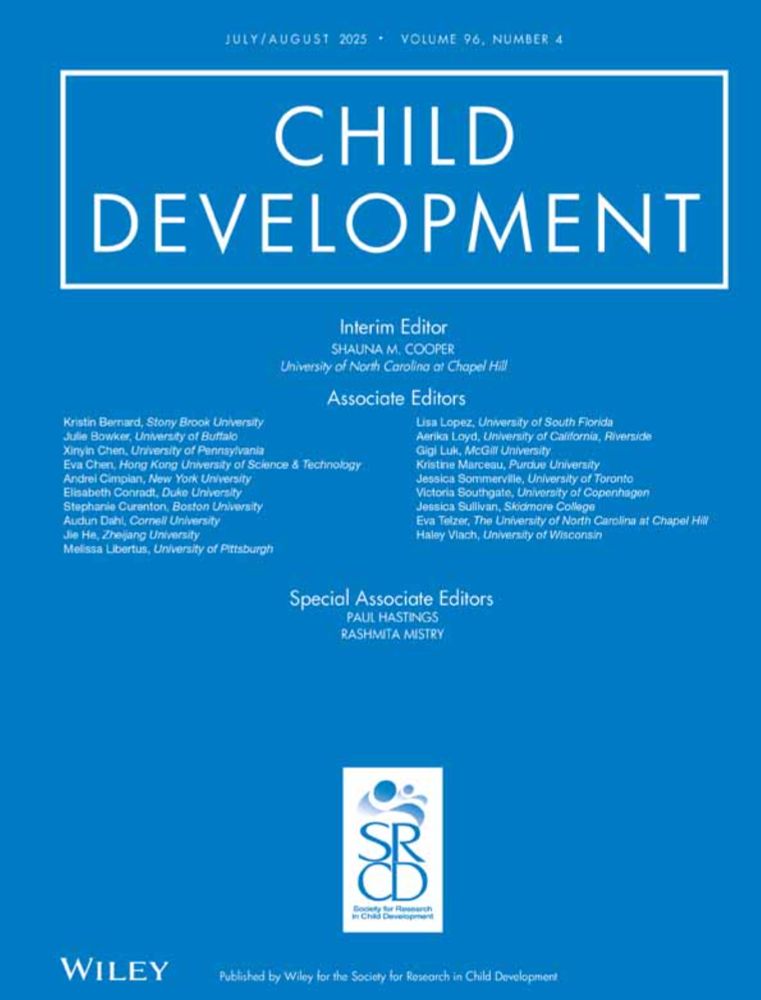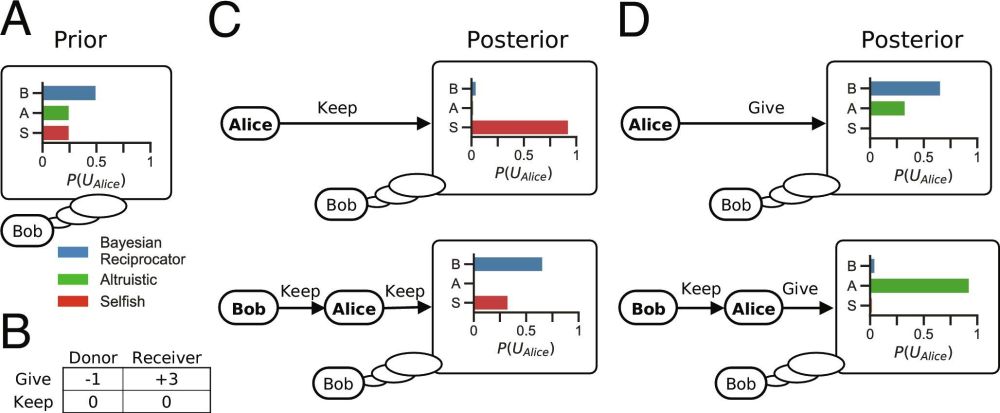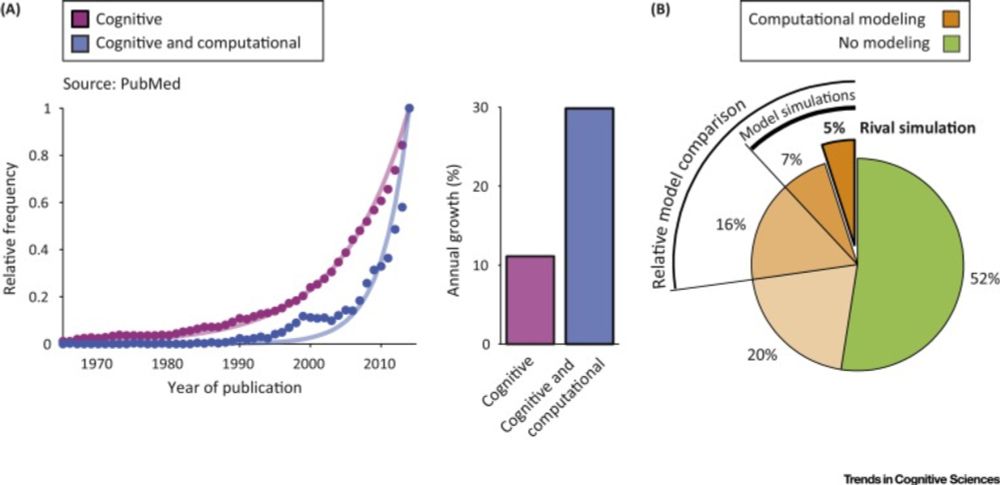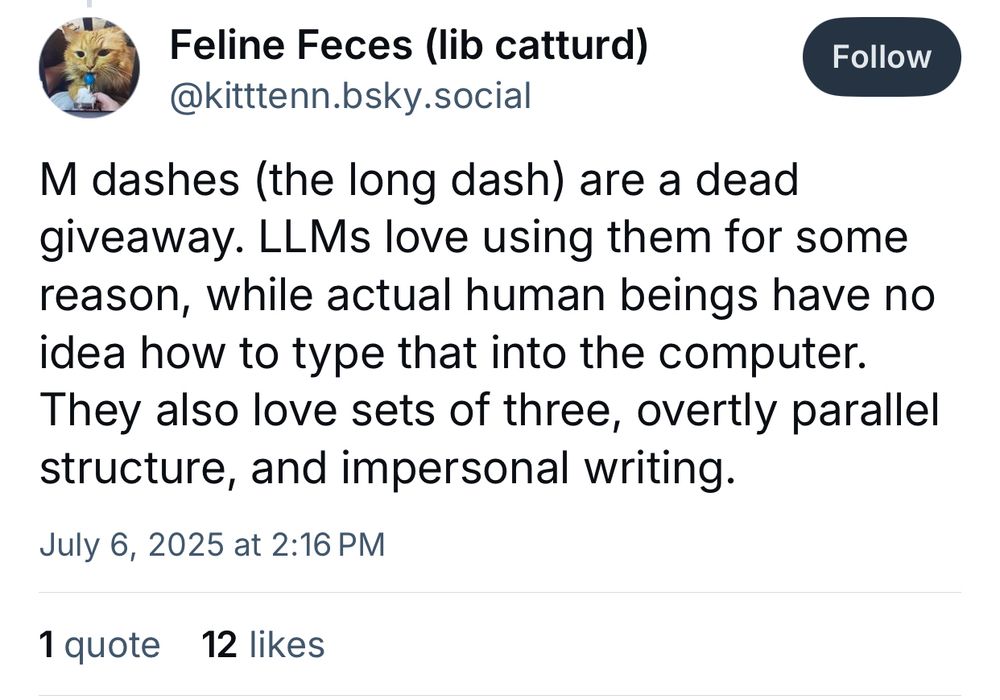
Hybrid neural–cognitive models reveal how memory shapes human reward learning
05.02.2026 11:28 — 👍 9 🔁 5 💬 0 📌 0@fredcallaway.bsky.social
I study how people solve big problems with small brains. Starting at Dartmouth in 2026—I'm recruiting! https://fredcallaway.com

Hybrid neural–cognitive models reveal how memory shapes human reward learning
05.02.2026 11:28 — 👍 9 🔁 5 💬 0 📌 0Convincing evidence that people recall individual past experiences to inform decisions—specifically when an easier incremental learning strategy isn’t available. Also, a masterclass in experimental design.
25.01.2026 16:12 — 👍 16 🔁 0 💬 0 📌 0With some trepidation, I'm putting this out into the world:
gershmanlab.com/textbook.html
It's a textbook called Computational Foundations of Cognitive Neuroscience, which I wrote for my class.
My hope is that this will be a living document, continuously improved as I get feedback.
Aha, clever. So I guess the behavioral signature would be an increased stopping probability specifically after extreme observations (relative to mean of past observations)
25.01.2026 14:41 — 👍 1 🔁 0 💬 0 📌 0Very interesting result! Apologies if I missed this, but do you have a sense what the "raw" behavioral signature of ΔES is? In particular, how can we distinguish it from collapsing bound / urgency? @mmiedl.bsky.social
21.01.2026 14:17 — 👍 1 🔁 0 💬 2 📌 0
Writing is thinking
Outsourcing the entire task of writing to LLMs will deprive us of the essential creative task of interpreting our findings and generating a deeper theoretical understanding of the world.
How do we achieve few-shot generalization? New work led by @fabianrenz.bsky.social dives into the role of replay in learning and using structure to generalize reward. Dream team effort with Shany Grossman @nathanieldaw.bsky.social Peter Dayan & @doellerlab.bsky.social
www.biorxiv.org/content/10.6...

Now out in JEP: General, "How working memory and reinforcement learning interact when avoiding punishment and pursuing reward concurrently"
psycnet.apa.org/record/2026-...
Preprint with final version: osf.io/preprints/ps...
1/n
This feels to me like saying “how gas might viably work without the need for pressure and temperature.” Representations are just a way to describe neural activity, which is itself just a way to describe a bunch of particles moving around. The question is whether it’s a *useful* description.
06.01.2026 14:17 — 👍 1 🔁 0 💬 1 📌 0FWIW I started unfollowing people who mostly post political content a few months ago and my feed is now mostly cool science. Complete control over what you see is a big benefit of bsky!
09.12.2025 15:14 — 👍 5 🔁 0 💬 1 📌 0We're excited to announce that Cognitive Science at Dartmouth is recruiting PhD students to work collaboratively with me, Steven Frankland, and Fred Callaway. Come study the principles and mechanisms that enable us to understand, plan, and act in the world! Info: sites.dartmouth.edu/cogscigrad/
23.10.2025 17:30 — 👍 59 🔁 39 💬 1 📌 1Yes! @upenn.edu declines signing The Compact. I'm proud of this decision.
16.10.2025 17:18 — 👍 18 🔁 3 💬 0 📌 0That makes sense, thanks!
16.10.2025 12:22 — 👍 1 🔁 0 💬 0 📌 0Against better judgment, I will ask a sincere question. Why is this best understood as trivializing rather than normalizing? I’m assuming it’s not literally the POS but instead using the term to describe common patterns of thought and behavior; is that right?
16.10.2025 01:28 — 👍 0 🔁 0 💬 1 📌 0
1st Sharp Lab preprint! 🚨 We tested how anxiety affects task generalization—not how people generalize threat stimuli, but how they reuse action-outcome structures when planning in new contexts.
Worry makes people avoid reusing actions that co-occurred w/ threat!
📄: osf.io/preprints/ps...
🧵 1/12

Forget modeling every belief and goal! What if we represented people as following simple scripts instead (i.e "cross the crosswalk")?
Our new paper shows AI which models others’ minds as Python code 💻 can quickly and accurately predict human behavior!
shorturl.at/siUYI%F0%9F%...


New in @pnas.org: doi.org/10.1073/pnas...
We study how humans explore a 61-state environment with a stochastic region that mimics a “noisy-TV.”
Results: Participants keep exploring the stochastic part even when it’s unhelpful, and novelty-seeking best explains this behavior.
#cogsci #neuroskyence

Summary of design and results from our three studies. (A: Design) Each study used a similar experimental design, measuring both positive and negative demand in an online experiment, with three commonly-used task types (dictator game, vignette, intervention). Our experiments had ns ≈ 250 per cell. (B: Results) Observed demand effects were statistically indistinguishable from zero. The plot shows means and 95% confidence intervals for standardized mean differences derived from frequentist analyses of each experiment and an inverse variance-weighted fixed-effect estimator pooling all experiments (solid bars). Prior measurements of experimenter demand from a previous dictator game experiment (de Quidt et al., 2018; standardized mean difference from regression coefficient) and a meta-analysis primarily including small-sample, in-person studies (Coles et al., 2025; Hedge’s g statistic) are also shown for comparison (striped bars). The main text includes Bayesian analyses that quantify our uncertainty.
We often hear from reviewers: "what about demand effects?" So we developed a method to eliminate them. Something weird happened during testing: We couldn’t detect demand effects in the first place! (1/8)
15.09.2025 17:18 — 👍 86 🔁 40 💬 3 📌 6
Happy to share "The Dynamics of Caregiver Unpredictability Shape Moment-to-Moment Infant Looking During Dyadic Interaction," out now in Child Development thanks to a large team of people I worked on this with! srcd.onlinelibrary.wiley.com/doi/pdfdirec...
06.08.2025 15:08 — 👍 27 🔁 10 💬 1 📌 1
Our new paper is out in PNAS: "Evolving general cooperation with a Bayesian theory of mind"!
Humans are the ultimate cooperators. We coordinate on a scale and scope no other species (nor AI) can match. What makes this possible? 🧵
www.pnas.org/doi/10.1073/...

@stepalminteri.bsky.social et al. made this point 8 years ago
www.cell.com/trends/cogni...
Centaur's performance may be largely driven by learning a good model of behavioral auto-regression—independent of the task. An important lesson for cognitive modelers: higher likelihood ≠ better account of behavior.
osf.io/preprints/ps...
If you include emotion recognition in "physiognomy", sure—but that's an unusual use of the term. If (1) people with PTSD have a different distribution of emotional responses and (2) emotional state can be inferred from facial expression, then it follows that one can infer PTSD from images.
14.07.2025 10:14 — 👍 1 🔁 0 💬 1 📌 0Completely agree. I just think it’s in all of our interests if we are as precise as possible when criticizing irresponsible use of AI. The cultural bias point is a strong one. I’m less sure about the blanket statement that a statistical model can’t do what’s claimed here *in principle*.
13.07.2025 21:54 — 👍 0 🔁 0 💬 1 📌 0I must be misunderstanding you, but don’t people detect emotion (internal mental state) from facial expression all the time?
13.07.2025 19:45 — 👍 0 🔁 0 💬 2 📌 0preprint alert 🚨
1/ Can we accurately detect sequential replay in humans using Temporally Delayed Linear Modelling (#TDLM)? In our recent study, we could not find any replay and decided to dig deeper by running a hybrid simulation with surprising results. Link to preprint & details below 👇
Our study is out in Nature!
Using wireless Neuropixels we recorded hippocampal activity in freely flying bats and uncovered replay and theta(less) sweeps, revealing striking differences from classic rodent models.
👉 www.nature.com/articles/s41...
I asked ChatGPT to respond to this critique. It replies:
"That’s a sharp observation—and honestly, a fair one. ChatGPT can sound overly agreeable or eager to please, much like..."

Feline Feces (lib catturd) @kitttenn.bsky.social M dashes (the long dash) are a dead giveaway. LLMs love using them for some reason, while actual human beings have no idea how to type that into the computer. They also love sets of three, overtly parallel structure, and impersonal writing. July 6, 2025 at 2:16 PM 1 quote 12 likes
Stop spreading this garbage about em dashes in ACTUAL EDITED PROSE OH MY GOD.
Plenty of actual human beings know how to type em dashes! We’re called “writers” and “editors” — maybe you’ve heard of us?